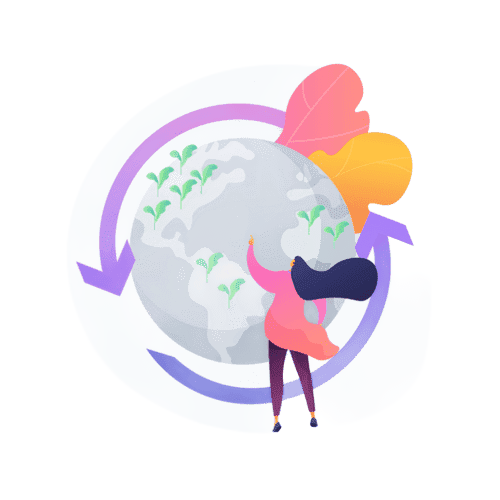The Future of Innovation: How Industry 4.0 is Driving Sustainable Development
Industry 4.0 is transforming manufacturing and business operations by integrating digital technologies to drive sustainable innovation. This article explores the role of Industry 4.0 in fostering eco-friendly practices, enhancing efficiency, and optimizing resource utilization. A structured roadmap outlines how businesses can leverage Industry 4.0 for long-term sustainability and competitive advantage.

The Era of Industry 4.0 and Sustainability
The world is at the forefront of a transformative industrial revolution—Industry 4.0. This digital-driven era is not just about automation and efficiency; it is reshaping industries by integrating sustainability into core business practices. Industry 4.0 is an enabler of sustainable innovation, bringing advanced technologies such as the Internet of Things (IoT), Artificial Intelligence (AI), big data analytics, and additive manufacturing to drive environmental and economic benefits. But how exactly does this revolution contribute to sustainable innovation? This article explores the roadmap to sustainable innovation and the pivotal role Industry 4.0 plays in achieving it.
Understanding Industry 4.0: A Paradigm Shift in Manufacturing
Industry 4.0 is characterized by the integration of digital technologies into manufacturing and business processes. It builds on the following foundational technologies:
- Artificial Intelligence & Machine Learning: Enhancing decision-making processes and optimizing energy consumption.
- Big Data & Analytics: Facilitating predictive maintenance and efficiency improvements.
- Internet of Things (IoT): Enabling real-time monitoring and control of operations.
- Blockchain: Ensuring transparency and traceability in supply chains.
- Additive Manufacturing (3D Printing): Reducing waste and enabling resource-efficient production.
- Cyber-Physical Systems (CPS): Connecting physical processes with digital capabilities for smarter manufacturing.
The Role of Industry 4.0 in Sustainable Innovation
A systematic review of Industry 4.0’s role in sustainable development identifies 11 core functions that facilitate sustainable innovation:
1. Advanced Manufacturing Competency (AMC)
- Enhances production efficiency while minimizing waste and energy use.
- Promotes lean and green manufacturing practices.
2. Green Absorptive Capacity Development (GACD)
- Encourages businesses to recognize and integrate environmental knowledge.
- Enhances capabilities to develop eco-friendly innovations.
3. Green Process Innovation Capacity (GPSIC)
- Focuses on modifying business processes to be more eco-friendly.
- Uses Industry 4.0 technologies to optimize energy consumption.
4. Green Product Innovation Capacity (GPTIC)
- Supports the development of sustainable products through digital simulations and additive manufacturing.
- Enables rapid prototyping of eco-friendly designs.
5. Interfunctional Collaboration and Learning (ICL)
- Breaks down silos in organizations to foster sustainability-focused teamwork.
- Enhances knowledge-sharing across departments and stakeholders.
6. New Product Development Competency (NPDC)
- Accelerates the innovation of green products by leveraging digital design tools.
- Enables companies to react swiftly to changing environmental demands.
7. Product Life-Cycle Management Capability (PLMC)
- Ensures sustainable practices across a product’s entire life cycle.
- Implements digital twin technology to track environmental impact.
8. Sustainable Innovation Orientation Development (SIOD)
- Aligns corporate strategy with sustainability goals.
- Encourages businesses to invest in green innovation.
9. Sustainable Partnership and Collaboration (SPC)
- Strengthens alliances with green technology providers and eco-conscious partners.
- Facilitates knowledge-sharing and co-development of sustainable solutions.
10. Sustainable Talent Management (STM)
- Promotes workforce training in sustainability best practices.
- Utilizes AI-driven HR solutions to recruit eco-conscious talent.
11. Value Chain Integration (VCI)
- Enhances transparency and efficiency in supply chains.
- Implements IoT and blockchain to track sustainability metrics.
%
Machine Downtime Reduction
By employing IoT, advanced sensors, and AI/ML for predictive maintenance, companies have reduced machine downtime by up to 50%. Source: Cognizant
%
Quality Enhancement
Implementing Industry 4.0 solutions has led to nearly a 20% improvement in product quality.
Source: Cognizant
The Roadmap to Sustainable Innovation Under Industry 4.0
The transition to sustainable innovation requires a structured approach. The roadmap involves the following stages:
1. Developing Interfunctional Collaboration & Learning
- Foster a culture of sustainability across all departments.
- Implement digital tools to streamline communication.
2. Integrating Value Chain Partners
- Engage suppliers and distributors in sustainability initiatives.
- Utilize real-time data for optimizing resource usage.
3. Building Advanced Manufacturing Competency
- Invest in smart factories and automated green manufacturing technologies.
- Leverage AI to monitor and reduce environmental footprints.
4. Enhancing Green Product and Process Innovation
- Deploy Industry 4.0 technologies for eco-friendly product development.
- Use blockchain for ethical sourcing and supply chain traceability.
5. Measuring & Scaling Sustainable Innovation
- Define key performance indicators (KPIs) for sustainability.
- Expand successful innovations across business units and industries.
Challenges & Future Directions
While Industry 4.0 presents vast opportunities for sustainability, it also introduces challenges:
- High Initial Costs: Implementing smart technologies requires significant investment.
- Data Security & Privacy Risks: Increased connectivity exposes businesses to cyber threats.
- Workforce Adaptation: Employees need to be reskilled to work with digital tools.
- Regulatory Compliance: Businesses must navigate complex sustainability regulations.
Future research should focus on the development of policies that incentivize green digital transformation, address ethical concerns surrounding automation, and explore the role of AI in optimizing circular economy models.
Conclusion
Industry 4.0 is more than an industrial revolution; it is a pathway toward a sustainable future. By leveraging digital transformation, businesses can enhance efficiency, reduce environmental impact, and create long-term value for all stakeholders. However, the success of this transition depends on strategic investments, collaboration, and policy support. As we move forward, embracing Industry 4.0 for sustainability is not just an option—it is an imperative for businesses and societies alike.
References
- Ghobakhloo, M., et al. (2021). Industry 4.0, Innovation, and Sustainable Development: A Systematic Review and a Roadmap to Sustainable Innovation.
- Digital Transformation and Innovation for a Sustainable Future, MDPI
- The Impact of Digital Transformation on the Sustainable Development of Manufacturing Firms, Journal of Economics and Development
- Digital Transformation as an Enabler of Sustainability Innovation and Performance, RESEARCHGATE
- Digital Transformation Drives Sustainable Innovation Capability, MDPI
- Digital Transformation, Smart Technologies, and Eco-Innovation, Sage Journals
Wanna know more? Let's dive in!
[dsm_gradient_text gradient_text="The Cobot Conundrum: How AI is Rewriting the Rules of Robot Safety in the Age of Recycling" _builder_version="4.27.5" _module_preset="default" header_font="Questrial|||on|||||" header_text_align="center" header_letter_spacing="5px"...
Newsletter 2
[dsm_gradient_text gradient_text="Ms Matter Newsletter 2026 #1" _builder_version="4.27.4" _module_preset="default" header_font="Questrial|||on|||||" header_text_align="center" header_font_size="36px" header_letter_spacing="5px" filter_hue_rotate="100deg"...
Your AI Ready for the Future? Inside the New AI Maturity Model
[dsm_gradient_text gradient_text="Your AI Ready for the Future? Inside the New AI Maturity Model" _builder_version="4.27.0" _module_preset="default" header_font="Questrial|||on|||||" header_text_align="center" header_letter_spacing="5px" filter_hue_rotate="100deg"...
Cooling the Future: How AI Makes Data Centers Greener
[dsm_gradient_text gradient_text="Cooling the Future: How AI Makes Data Centers Greener" _builder_version="4.27.0" _module_preset="default" header_font="Questrial|||on|||||" header_text_align="center" header_letter_spacing="5px" filter_hue_rotate="100deg"...
When Cars Became Code: How AI is Redefining Automotive Production
[dsm_gradient_text gradient_text="When Cars Became Code: How AI is Redefining Automotive Production" _builder_version="4.27.0" _module_preset="default" header_font="Questrial|||on|||||" header_text_align="center" header_letter_spacing="5px" filter_hue_rotate="100deg"...
Supercharged Smarts: How AI Is Rewiring Electric Vehicle Batteries
[dsm_gradient_text gradient_text="Supercharged Smarts: How AI Is Rewiring Electric Vehicle Batteries" _builder_version="4.27.0" _module_preset="default" header_font="Questrial|||on|||||" header_text_align="center" header_letter_spacing="5px" filter_hue_rotate="100deg"...
New Zealand 2025
Duration: 2 weeks Cities: Christchurch, Hokitika, Kaikōura, Westport, Te Waipounamu, Nelson, Timaru Miles Travelled: 30 000Traveling through parts of New Zealand’s South Island offers a rich tapestry of history, landscape, and local character that leaves a quiet...
Resolving Die Peel Issues in an Automotive & Aerospace Electronics Manufacturing Plant
Background A global electronics manufacturer supplying critical components to the automotive and aerospace industries received multiple customer complaints regarding the premature failure of transistor-based power modules. Field analysis revealed that the root cause...
Transforming a Dysfunctional Quality Team in Automotive and Aerospace Manufacturing
Background The quality department of a Tier-1 manufacturer in the automotive and aerospace sectors was expected to ensure strict compliance to both customer and regulatory standards. Instead, it became a bottleneck plagued by poor collaboration, low morale, and high...
Resolving Customer Complaints Related to Electrical Connector Module Failures
Background ElectroTech, a manufacturer of electrical distribution components, including connector modules for power systems, received a major customer complaint regarding intermittent connection failures in one of its core electric product lines. The failures led to...
Singapore 2019
Duration: 3 days Cities: Singapore Miles Travelled: 6,300Visiting Singapore was like stepping into the future while still being surrounded by rich history and culture. From the moment I arrived at Changi Airport, with its indoor waterfalls and lush gardens, I knew...
Hawaii 2015
Duration: 2 weeks Cities: Honolulu Miles Travelled: 7,000Our trip to Hawaii was truly a once-in-a-lifetime experience, filled with breathtaking landscapes, warm hospitality, and unforgettable moments. We stayed in Honolulu on the island of Oahu, where the vibrant mix...










